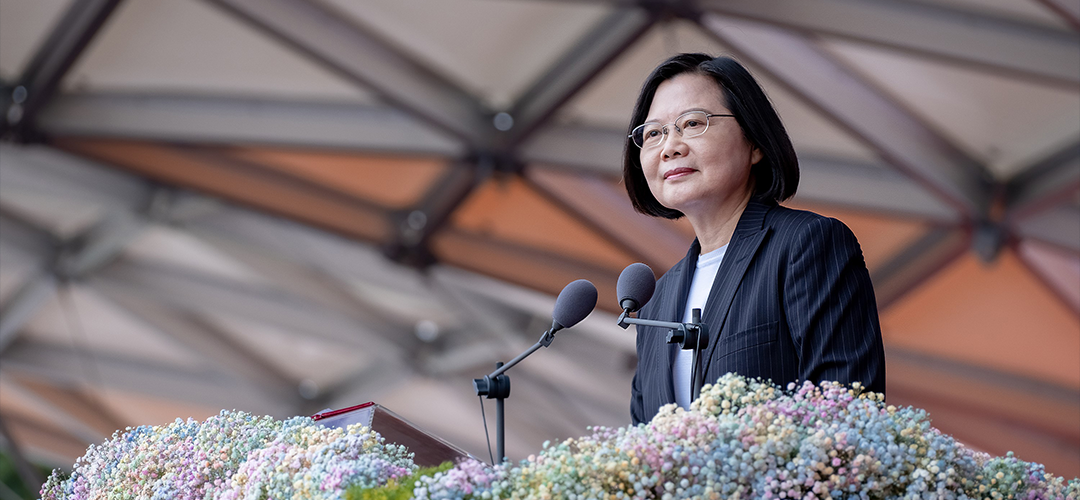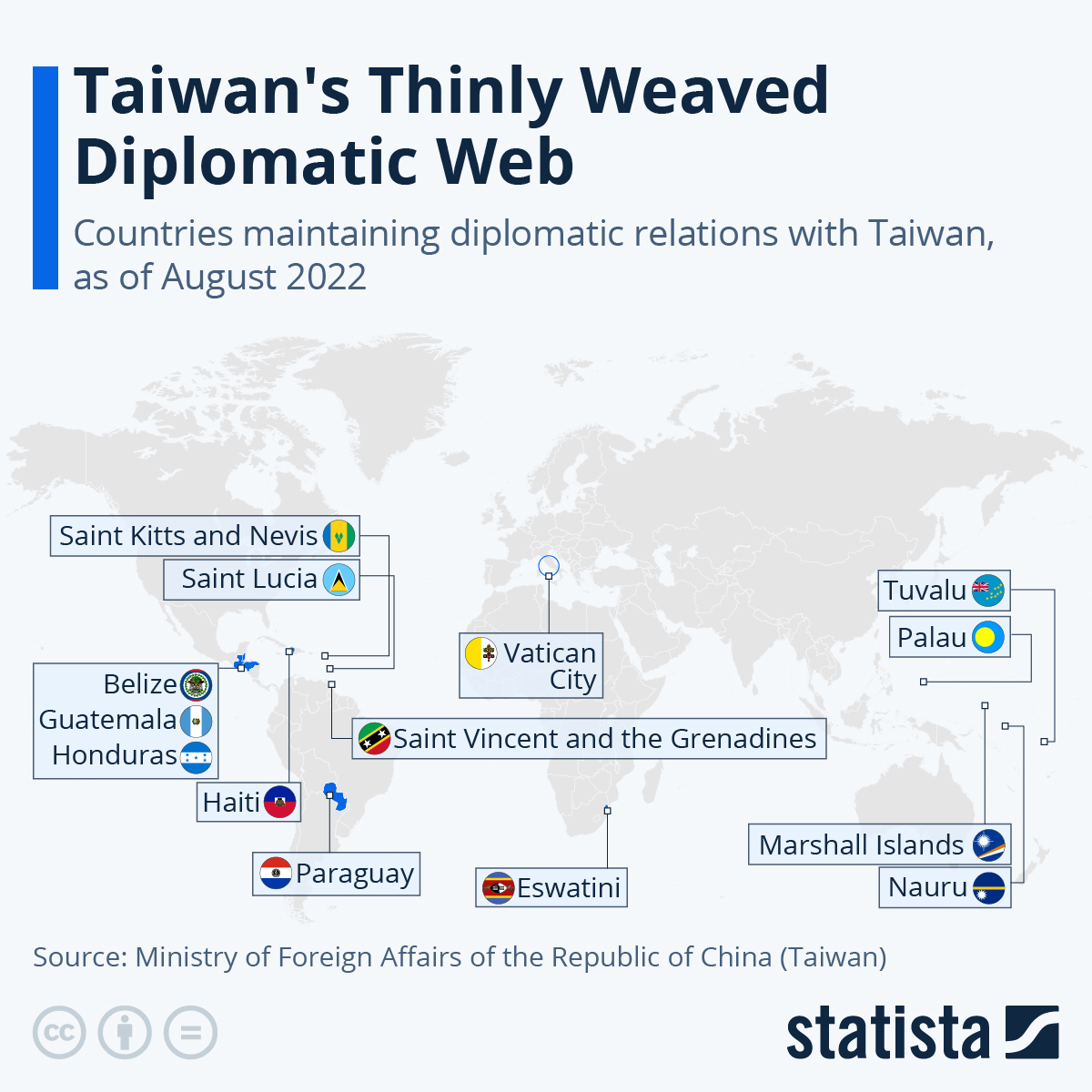Taiwan: Walking a Diplomatic Tightrope?
April 1, 2023 | Expert Insights

In 1971 the People’s Republic of China officially took its seat at the United Nations as one of the P5, evicting Chiang Kai‐shek’s Republic of China (ROC), the long-term ally of the U.S.
Since then, most countries have followed a ‘One China Policy’ and Taipei has slowly lost diplomatic support around the world to Beijing.
Background
When the Chinese civil war ended with a total victory for the Reds under Mao Zedong, the Nationalist forces under Generalissimo Chiang Kai-shek fled to their island fortress of Formosa. War exhausted, Mao's Red Army was in no position to mount an assault on this fortress, and assuming that cut off from the rest of the world, this last bastion too would, in time, fall like a ripe plum into their hands. Alas, the wait has stretched to over three-quarters of a century!
Chiang Kai-shek had been given the status of one of the five victors of World War II and, accordingly, sat in one of the permanent seats in the UN Security Council. It remained a close ally of the U.S. and economically prospered in the post-war economic boom.
Thanks to Pakistan’s role as an intermediatory, the U.S. -China thaw took place in the early 1970s during the Nixon Administration, spearheaded by Henry Kissinger. Consequently, in 1971, the UNGA evicted the ROC from the UN altogether and welcomed Mao’s PRC into the high table of UNSC.
This change was long expected as the alignment of forces in the Cold War was changing by the 1970s. Open divisions between the Chinese and the Soviets had already developed, resulting in the eventual official Sino-Soviet split. China was now much more acceptable to the West as a counterfoil to the USSR.
Obviously, in such an arrangement, the importance of the small island of Taiwan would fall by the wayside. But this did not happen suddenly. Throughout the 1970s, Washington and Beijing continued to engage with each other to pursue their common interests without establishing official diplomatic relations. The U.S. did not want a drastic change in the status quo then. But slowly and steadily, the reality dawned on Western policymakers that the international diplomatic status of Taiwan had to be sacrificed if the Communist Chinese were to be incorporated into the global system. The huge untapped Chinese market beckoned Western entrepreneurs. Taiwan itself was still a dictatorship under the rule of the Nationalist government. So, no sympathy could be generated for it among Western countries, even as a fellow democracy fighting against Communist aggression.
This trend was to catch on fast with the entire global community, and soon, ROC was a global pariah like the white apartheid regime of South Africa. The situation has only worsened, and Honduras is the latest to abandon them.

Analysis
The recent diplomatic switch by Honduras is part of a wider historical trajectory. Since the 1970s, many countries have made such a change. At the beginning of this year, only 13 countries and Vatican City/ Holy See continued to formally recognise ROC.
But the context in which such a change has occurred is important. Earlier, it was the realities of Cold War geopolitics which made countries switch their diplomatic allegiance from Taiwan to China. Today it is the chequebook diplomacy of Beijing.
Small Latin American countries like Honduras always need a big economic power to support them. Especially following the Covid-19 pandemic, their economies are in total shambles. So, they require a financial ally to bail them out.
The Taiwanese economy is a powerhouse in East Asia. But still, it is tiny compared to the Chinese economy. So, Taiwan cannot hope to compete with China in aggressive economic diplomacy, and Beijing will always have more cash to offer to extremely poor countries at seemingly gratuitous terms.
Therefore, Taiwan has decided to play the card that it already has at its hand. This is the unofficial geo-strategic alliance that it has with the United States. In this context, Taiwanese President Tsai Ing-wen decided to make two unofficial stopovers in the United States on the way to meet Latin American allies Belize and Guatemala. Before her trip, she said, "Taiwan's determination to go out into the world will only grow stronger". The reception she has received in the U.S. has been both positive and negative. It has been stressed that she would not meet with any official from the Biden administration.
The internal political situation within Taiwan is also undermining Taiwan’s national security. There are sharp divisions between the two main parties, the Kuomintang (KMT) and the centre-left Democratic Progressive Party (DPP), on how to deal with China. The KMT accepts the geo-political reality of China as a large neighbour just across a small strip of water. They believe engaging with Beijing is better than taking a confrontational line based on Western support, mainly from the United States, which might or might not come. The DPP takes the exact opposite position, and it views Taiwan’s democracy as too important to fall under the influence of the Chinese Communist Party. In light of this, the two parties' leaders have taken alternate trips. In response to the Taiwanese President's informal visit to the U.S., the leader of the KMT has made a trip to China to cool nerves in Beijing.
Apart from this, there are divisions within Taiwanese society on the question of China. This division is mainly between people who came to the island with the defeated nationalist forces and the native Taiwanese. The former has close historical and family ties with mainland China, and these ties have been used extensively by Beijing to split public opinion in the island. The latter has no such ties with China and views it with deep suspicion.
In the last few years, Taiwan has seen an upsurge in the informal support it has received from bigger nations. Even if nations like India have not formally recognised ROC, the levels of engagement have increased at all levels substantially. The fact that ROC is an acknowledged superpower in semiconductor production could be one reason for this newfound popularity. Another is the rising belligerence of China's wolf diplomacy, which has not earned it any friends amongst its neighbours and encouraged them to make overtures to Taipei in a gesture of defiance.
Assessment
- While Taiwan is losing official diplomatic partners, unofficially, many other countries are engaging with it. The latest informal visit of the Taiwanese President to the United States has increased tensions across the Taiwan Straits.
- Beijing is biding its time before making a move on Taiwan. Next year’s presidential elections in Taiwan will be crucial. The current President, known for her anti-China stance, will have to step down as her term limit expires. There is an increasing possibility that the KMT might come back to power. If that happens, then Beijing might find that it has an ally in Taipei.








Comments